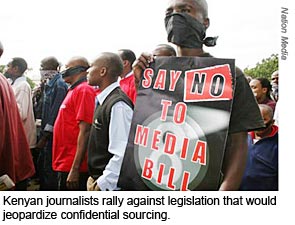New York, August 16, 2007—Hundreds of journalists marched silently Wednesday in the Kenyan capital of Nairobi with their mouths gagged to protest a bill that would restrict press freedom. The law, which would force editors to name their sources if a story led to a court cases, was sent to President Mwai Kibaki last week for review.
Marchers tied the gates of Kenya’s parliament with black ribbons to protest “a retrograde measure born out of a dark legislative process,” after 29 MPs approved an amendment in Kenya’s Media Bill that requires editors to disclose confidential sources when a story becomes the subject of litigation, said Hanningtone Gaya, chairman of the Kenyan Media Owners Association. Thirty votes is the necessary parliamentary quorum in Kenya.
“The protection of sources is at the core of the practice of journalism, and any attempt to curb that right is a grave threat to press freedom,” said Joel Simon, CPJ’s executive director. “We urge President Kibaki to reject this proposal, which runs counter to Kenya’s democratic tradition.”
The amendment’s sponsor, ruling party lawmaker Muriuki Karue, said the measure was intended to prevent journalists from “assassinating the character” of public figures, according to the local press. Karue had sued Kenya’s two leading newspapers in 2003 for alleged defamation. Both suits were later dismissed.
The bill threatens the future of investigative journalism, exposing journalists to court proceedings in which they would be compelled to testify, said David Makali, director of Kenya’s Media Institute. It also contravenes existing legislation protecting whistleblowers, he said.
Several radio stations in Nairobi observed a morning news blackout as throngs of journalists and civil society leaders marched from Nairobi’s Freedom Corner to Kenya’s parliament to present a petition urging Kibaki not to sign the proposed bill.
The march came a day after Attorney General Amos Wako handed down a legal opinion calling for a “reformulation” or “deletion of the clause altogether,” according to news reports. Wako said he would advise Kibaki to return the bill to parliament, a view later affirmed by Information Minister Mutahi Kagwe.
In recent years, Kenya’s feisty media has exposed several high-profile scandals using anonymous sources. In response, authorities have repeatedly used libel suits that brought record damages. They have also introduced repressive media legislation that targets so-called scandal sheets and employed police raids to silence their critics.
In the lead-up to presidential and parliamentary elections in December, journalists are also concerned by provisions in a freedom of information bill that would impose restrictions on media ownership and grant the government powers of search and seizure of media outlets, said Ezekiel Mutua, Secretary-General of the Kenya Union of Journalists.
